Healthcare Policy Reforms and Impact on Service Users in UK
23 Pages9932 Words292 Views
Added on 2023-06-18
About This Document
This report discusses the healthcare policy reforms in UK and their impact on service users. It covers the ideologies and backgrounds affecting healthcare policy developments, stakeholders influencing policy development, and recent proposals in healthcare policy. The report also includes the impact of policy developed during coalition government on service users in healthcare.
Healthcare Policy Reforms and Impact on Service Users in UK
Added on 2023-06-18
ShareRelated Documents
Health And Social Care

TABLE OF CONTENTS
INTRODUCTION...........................................................................................................................3
MAIN BODY..................................................................................................................................3
1.1 Main healthcare policy reforms.............................................................................................3
1.2 Conservative\ liberal coalition health agenda........................................................................5
1.3 Recent proposals in healthcare policy and its impact on service users.................................8
2.1 Ideologies and backgrounds which affects the healthcare policy developments.................10
2.2 Stakeholders can influence policy development..................................................................12
3.1 Impact of policy that developed during coalition government on service users in healthcare
...................................................................................................................................................14
3.2 The government policy on supporting service users with long term condition and
implication for service user.......................................................................................................17
CONCLUSION..............................................................................................................................20
REFERENCES................................................................................................................................1
INTRODUCTION...........................................................................................................................3
MAIN BODY..................................................................................................................................3
1.1 Main healthcare policy reforms.............................................................................................3
1.2 Conservative\ liberal coalition health agenda........................................................................5
1.3 Recent proposals in healthcare policy and its impact on service users.................................8
2.1 Ideologies and backgrounds which affects the healthcare policy developments.................10
2.2 Stakeholders can influence policy development..................................................................12
3.1 Impact of policy that developed during coalition government on service users in healthcare
...................................................................................................................................................14
3.2 The government policy on supporting service users with long term condition and
implication for service user.......................................................................................................17
CONCLUSION..............................................................................................................................20
REFERENCES................................................................................................................................1
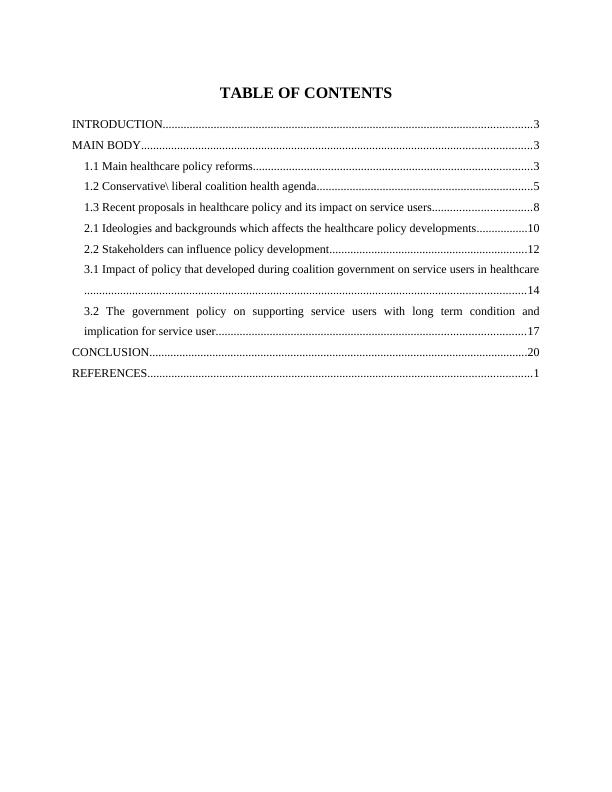
INTRODUCTION
Health and social care are related to the services which are provided in UK. It includes all
the infrastructure of healthcare and the private sector. It is related to the treatment of bad health
and medical conditions in the healthcare centres as well as in the community. Social care is about
the care and support required for vulnerable people, normally in a community. It is not possible
to consider a world without any health or social care. Nurturing in this system has helped many
individuals and their families (Hawkins and McCambridge, 2019). There is some difference and
also an interconnection between health and social care. Health provides function to attain welfare
and is dependent on many reasons such as biological, environmental and some other living
standards. The aim of healthcare is offer medical care to individuals while also dealing with the
diagnosis and treatment of physical and mental disabilities. It is one of the biggest necessities
and helps in reducing social inequality at the time of health care. On the other hand, social care
deals with the day to day activities of living and following the basic hygiene and maintaining the
same. Having social care can help reducing the unnecessary visits to the healthcare systems and
also helps in quick discharge of patients lastly, making it less dependent on healthcare bodies.
Both health and social care will produce collaborative work which will make the society a better
place. This report deals with the different policies of healthcare and the factors influencing them.
MAIN BODY
1.1 Main healthcare policy reforms
During the time of election, healthcare was seen to have as the main issue from the public
side. The labour party responded to take this concern and reform different policies to introduce
more private sector involvement in the delivery of the healthcare. The basic standard of taking
care of the patients in the private hospitals of Britain is below the level which is found in the
public hospitals (Ferlie, 2017). There were new contracting arrangements made which resulted in
the increase of administration costs from inside of the systems. There was more faith in the
private sector management and its techniques which misplaced during the time when the real
problem on the national health services of the capacity. The labour party is committed to redefine
the different aspects of the healthcare and making it as a personal responsibility rather than
making it as a right. This lead Britain move towards the market based healthcare system.
National health services have contributed in providing free access to the healthcare for the people
Health and social care are related to the services which are provided in UK. It includes all
the infrastructure of healthcare and the private sector. It is related to the treatment of bad health
and medical conditions in the healthcare centres as well as in the community. Social care is about
the care and support required for vulnerable people, normally in a community. It is not possible
to consider a world without any health or social care. Nurturing in this system has helped many
individuals and their families (Hawkins and McCambridge, 2019). There is some difference and
also an interconnection between health and social care. Health provides function to attain welfare
and is dependent on many reasons such as biological, environmental and some other living
standards. The aim of healthcare is offer medical care to individuals while also dealing with the
diagnosis and treatment of physical and mental disabilities. It is one of the biggest necessities
and helps in reducing social inequality at the time of health care. On the other hand, social care
deals with the day to day activities of living and following the basic hygiene and maintaining the
same. Having social care can help reducing the unnecessary visits to the healthcare systems and
also helps in quick discharge of patients lastly, making it less dependent on healthcare bodies.
Both health and social care will produce collaborative work which will make the society a better
place. This report deals with the different policies of healthcare and the factors influencing them.
MAIN BODY
1.1 Main healthcare policy reforms
During the time of election, healthcare was seen to have as the main issue from the public
side. The labour party responded to take this concern and reform different policies to introduce
more private sector involvement in the delivery of the healthcare. The basic standard of taking
care of the patients in the private hospitals of Britain is below the level which is found in the
public hospitals (Ferlie, 2017). There were new contracting arrangements made which resulted in
the increase of administration costs from inside of the systems. There was more faith in the
private sector management and its techniques which misplaced during the time when the real
problem on the national health services of the capacity. The labour party is committed to redefine
the different aspects of the healthcare and making it as a personal responsibility rather than
making it as a right. This lead Britain move towards the market based healthcare system.
National health services have contributed in providing free access to the healthcare for the people
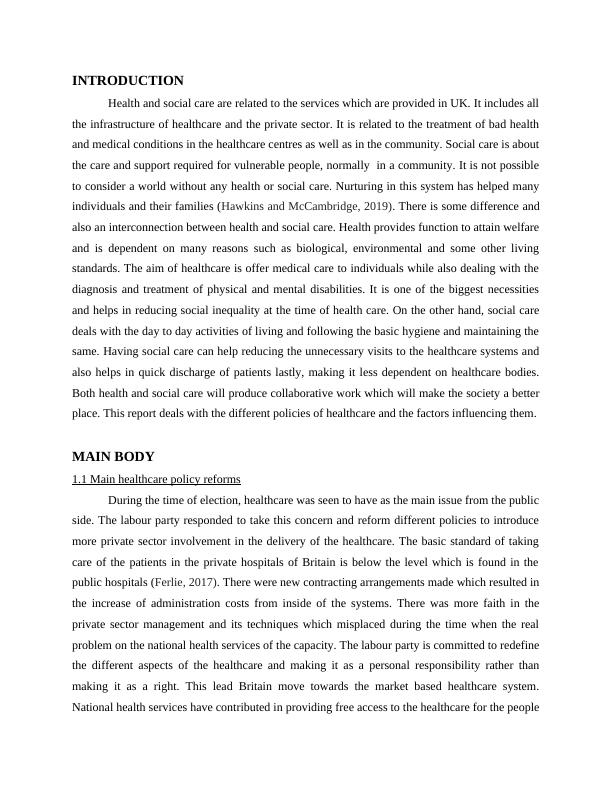
of UK at very low costs. The labour government has planned to reform the system in a radical
way. The labour government kept the belief of direct state and ownership for the public facility
being inefficient (Cummins, 2018). Labour party had a great involvement in the profits sector
where ownership and the operations of the publicly funded healthcare facilities, They said that
NHS must use the for profit sector during the time of commissioning healthcare services. Private
companies are supposed to bring in the management which is by the publicly owned hospitals.
This policy was clearly informed by the belief where public ownership and management are
hindrance and making an efficiently working healthcare system. NHS is supposed to move
towards a more market based model. The proposals of these policies were non ideological and
were made to discourage the public debate regarding the changes. Depending on the public
healthcare companies were there to offer a state funded health care system by introducing new
stakeholders in the healthcare system of Britain having the financial claims on the revenues of
NHS. This lead to increase in the costs of administration for NHS and moving the healthcare
provision.
The new labour government was appointed in 1997, which marked by making different
pledges used to dismantle the internal market. Regardless of the ideology, unacceptability in the
internal market is seen to lead sharp inequalities in the service provisions. New labour promised
to spend the saving generated from the scrapping the internal market and reducing on the waiting
for no exception (Buchan, Seccombe and Smith, 2018). The reports of the patient were left for
hours and days on waiting for the beds in hospital to be available. They established national
standards for the treatment and the program to modernise the national health services. They
formed commission for health improvement and national institute of clinical excellence which
was the key moment for the labour health policy. Because of this, the central body of the central
body was investigated and medical benefits were assessed with the methods of cost effectiveness
for different treatments and issuing the guidelines for services. It assessed the clinical
performance of the health service providers while also carrying out investigations on the serious
failures in healthcare. Performance indicators were set and the government published the list
having the rating regarding the performance.
New labour attained the level of command and control and also attempted in modernising
the hearts and minds for the national health services. Different agencies formed were converted
in the NHS institute which aimed for improvements and innovation. This was done to promote
way. The labour government kept the belief of direct state and ownership for the public facility
being inefficient (Cummins, 2018). Labour party had a great involvement in the profits sector
where ownership and the operations of the publicly funded healthcare facilities, They said that
NHS must use the for profit sector during the time of commissioning healthcare services. Private
companies are supposed to bring in the management which is by the publicly owned hospitals.
This policy was clearly informed by the belief where public ownership and management are
hindrance and making an efficiently working healthcare system. NHS is supposed to move
towards a more market based model. The proposals of these policies were non ideological and
were made to discourage the public debate regarding the changes. Depending on the public
healthcare companies were there to offer a state funded health care system by introducing new
stakeholders in the healthcare system of Britain having the financial claims on the revenues of
NHS. This lead to increase in the costs of administration for NHS and moving the healthcare
provision.
The new labour government was appointed in 1997, which marked by making different
pledges used to dismantle the internal market. Regardless of the ideology, unacceptability in the
internal market is seen to lead sharp inequalities in the service provisions. New labour promised
to spend the saving generated from the scrapping the internal market and reducing on the waiting
for no exception (Buchan, Seccombe and Smith, 2018). The reports of the patient were left for
hours and days on waiting for the beds in hospital to be available. They established national
standards for the treatment and the program to modernise the national health services. They
formed commission for health improvement and national institute of clinical excellence which
was the key moment for the labour health policy. Because of this, the central body of the central
body was investigated and medical benefits were assessed with the methods of cost effectiveness
for different treatments and issuing the guidelines for services. It assessed the clinical
performance of the health service providers while also carrying out investigations on the serious
failures in healthcare. Performance indicators were set and the government published the list
having the rating regarding the performance.
New labour attained the level of command and control and also attempted in modernising
the hearts and minds for the national health services. Different agencies formed were converted
in the NHS institute which aimed for improvements and innovation. This was done to promote
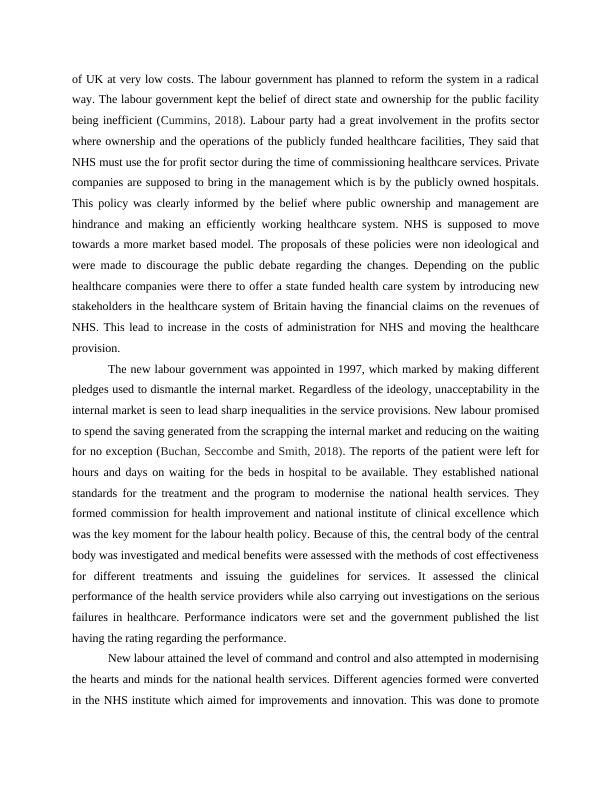
the innovative thinking and changing the ways of working (Smith, 2018). The priorities of the
policy by new labour was about improving the access and reducing the waiting and then later on
increasing the choices given to the patient with the wide range of healthcare providers. This lead
the private sector to provide service in more timely as well as efficient manner where the NHS
can purchase the services in order to generate benefits for the patients.
The labour government of UK brought many changes in the national health services from
the year 1997 to 2010. This was aimed to increase the choices given to the patients regarding the
place of the elective hospital care and boosting more competition between the public and private
service providers for the funded patients. In the year 2006, they initiated a health reform
evaluation program to determine the impact of changes. The high quality care represented the
aim of the government to focus on the next level for healthcare system reform in the UK by
putting in the quality of care while improving the responsiveness and efficiency (Allsop, 2018).
The cultural and behavioural changes lead the NHS to focus more on the generating high quality
for care. Public health budgets were introduced which were less problematic, depending on the
assumptions. The issues were focused on remedying and remaining the central part of the
reformed agenda. In the approach of the labour government resulted in forming the cuts in the
service which is done by the number of managers and having an increased efficiency. It made
NHS more financially attention. A project was introduced to reform the nurse trainings which
was a major change in the style of nursing training where the students nurse is a hospital
employee in a system supernumerary. It spends the parts of their time in getting higher education
and being a part of the clinical placement. There were new mechanism launched for the conjoint
funding for health and social services (Papageorgiou, and et.al., 2020). The new health policies
focused on handling the inequalities. New labour has taken some steps which will produce long
lasting benefits to the service users. High quality of healthcare services play an important part in
the lives of people and supports them from going through health problems.
1.2 Conservative\ liberal coalition health agenda
The health and social care act is about the implementation of different reformed programs
within the timetable which is feasible and there is an anticipated costs saving to be achieved. The
time scale in order to implement new time scales are dependent on different arrangements which
were supposed to be tight. The health and well being board was in transition period to trust the
policy by new labour was about improving the access and reducing the waiting and then later on
increasing the choices given to the patient with the wide range of healthcare providers. This lead
the private sector to provide service in more timely as well as efficient manner where the NHS
can purchase the services in order to generate benefits for the patients.
The labour government of UK brought many changes in the national health services from
the year 1997 to 2010. This was aimed to increase the choices given to the patients regarding the
place of the elective hospital care and boosting more competition between the public and private
service providers for the funded patients. In the year 2006, they initiated a health reform
evaluation program to determine the impact of changes. The high quality care represented the
aim of the government to focus on the next level for healthcare system reform in the UK by
putting in the quality of care while improving the responsiveness and efficiency (Allsop, 2018).
The cultural and behavioural changes lead the NHS to focus more on the generating high quality
for care. Public health budgets were introduced which were less problematic, depending on the
assumptions. The issues were focused on remedying and remaining the central part of the
reformed agenda. In the approach of the labour government resulted in forming the cuts in the
service which is done by the number of managers and having an increased efficiency. It made
NHS more financially attention. A project was introduced to reform the nurse trainings which
was a major change in the style of nursing training where the students nurse is a hospital
employee in a system supernumerary. It spends the parts of their time in getting higher education
and being a part of the clinical placement. There were new mechanism launched for the conjoint
funding for health and social services (Papageorgiou, and et.al., 2020). The new health policies
focused on handling the inequalities. New labour has taken some steps which will produce long
lasting benefits to the service users. High quality of healthcare services play an important part in
the lives of people and supports them from going through health problems.
1.2 Conservative\ liberal coalition health agenda
The health and social care act is about the implementation of different reformed programs
within the timetable which is feasible and there is an anticipated costs saving to be achieved. The
time scale in order to implement new time scales are dependent on different arrangements which
were supposed to be tight. The health and well being board was in transition period to trust the
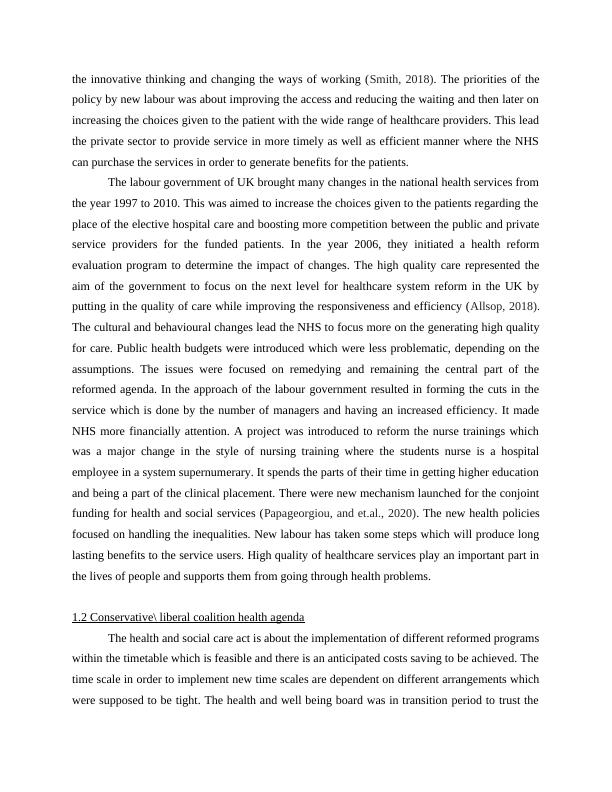
status and allocate the budgets for public health (Ma, Lemos and Vieira, 2020). Main markings
in the process of implementation of new arrangements includes having specific details in the
mandates of new operating organisations including the national health services. In the coalition
of healthcare reform program, the overall framework of the political responsibility as well as
accountability related to the health services in UK had a secretary of state which retains its
ministerial responsibility for the parliament with the provision of health services. The services
offered by the healthcare systems should be free from any charge and making and recovering the
charges which are provided under any enactment. The responsibilities of secretory of state is to
promote comprehensive to the national health services, they are supposed to hold up the
constitution of national health services while improving the quality of services. They are required
to have a continuous improvement in the outcomes generated for the aim on improving the
public health of public and also reducing the health inequalities.
The agreement having specific pledge focusing on increasing the public expenditure on
the health. It stated to an agreement of funding for the national health services must be increased
in real. This pledge was repeated in broad terms and in commitment with the national values
based on need and not ability to pay (Chin, 2018). The plan was to set national health services
free from the political management and releasing the fund for the front line. The other ideas
behind this was to introduce an independent of national health service board and to develop
monitor to economic regulations while keeping the quality regulated. It had planned to
strengthen the local democratic participation and attaining the accountability which included
elected representatives from the boards of primary care trust. The coalition program committed
to the national health as an expression for the national values and to be free at the point required
to use and based not being able to pay. There is a real increase in the health spending for each
year within the parliament.
It also committed to free the national health services from the political management and
increasing the democratic participation. This makes the national health services to be more
responsible for delivering a value for money and developing a much healthier nation. It stated to
stop the top down re organisations working under NHS and are coming in between the way of
attaining proper care for the patient. It ordered to cut the cost of the administration by a third and
pivoting the cash to the front lines. It asked to give every patient the freedom to select any of the
healthcare provider and meet the standards of NHS and within the prices set by the national
in the process of implementation of new arrangements includes having specific details in the
mandates of new operating organisations including the national health services. In the coalition
of healthcare reform program, the overall framework of the political responsibility as well as
accountability related to the health services in UK had a secretary of state which retains its
ministerial responsibility for the parliament with the provision of health services. The services
offered by the healthcare systems should be free from any charge and making and recovering the
charges which are provided under any enactment. The responsibilities of secretory of state is to
promote comprehensive to the national health services, they are supposed to hold up the
constitution of national health services while improving the quality of services. They are required
to have a continuous improvement in the outcomes generated for the aim on improving the
public health of public and also reducing the health inequalities.
The agreement having specific pledge focusing on increasing the public expenditure on
the health. It stated to an agreement of funding for the national health services must be increased
in real. This pledge was repeated in broad terms and in commitment with the national values
based on need and not ability to pay (Chin, 2018). The plan was to set national health services
free from the political management and releasing the fund for the front line. The other ideas
behind this was to introduce an independent of national health service board and to develop
monitor to economic regulations while keeping the quality regulated. It had planned to
strengthen the local democratic participation and attaining the accountability which included
elected representatives from the boards of primary care trust. The coalition program committed
to the national health as an expression for the national values and to be free at the point required
to use and based not being able to pay. There is a real increase in the health spending for each
year within the parliament.
It also committed to free the national health services from the political management and
increasing the democratic participation. This makes the national health services to be more
responsible for delivering a value for money and developing a much healthier nation. It stated to
stop the top down re organisations working under NHS and are coming in between the way of
attaining proper care for the patient. It ordered to cut the cost of the administration by a third and
pivoting the cash to the front lines. It asked to give every patient the freedom to select any of the
healthcare provider and meet the standards of NHS and within the prices set by the national
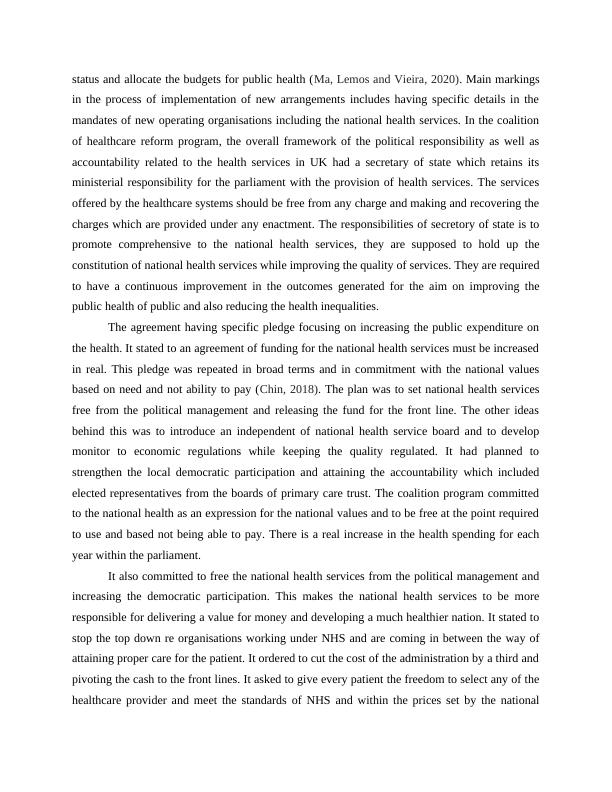
End of preview
Want to access all the pages? Upload your documents or become a member.
Related Documents
An Introduction to Healthcare Policylg...
|10
|2867
|114
An Introduction to Healthcare Policylg...
|9
|2605
|84
National Health Service (NHS) Case Study : Assignmentlg...
|6
|1454
|116
Health Care Policy Analysislg...
|8
|1731
|60
Managing Quality in Health and Social Care : Assignment Samplelg...
|17
|4779
|25
Regulatory Environment in Healthcarelg...
|4
|854
|436
